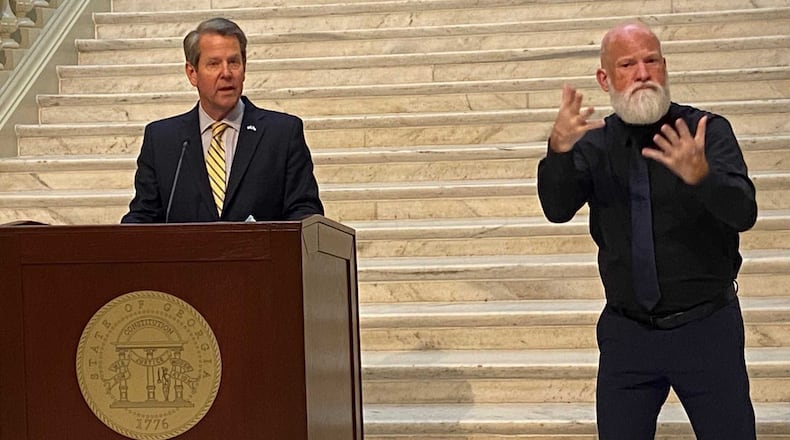Georgians as young as 55 and others with high-risk medical conditions will be eligible to receive the coronavirus vaccine under plans outlined Wednesday by Gov. Brian Kemp, setting up a potential bottleneck for doses.
State officials say the change will mean that an additional 3.3 million Georgians will be eligible for the vaccines starting Monday. However, the list of high-risk conditions will likely make the vast majority of Georgia adults qualified to get the shots.
The lengthy list covers a spectrum of health conditions all too common in Georgians, ranging from cancer, heart conditions and diabetes to high blood pressure, pregnancy and asthma. Also newly eligible are those who are overweight or obese. About two-thirds of Georgians would fit the definition, according to one federal study.
Even those who don’t qualify might still sign up. State officials didn’t announce any screening criteria or enforcement methods, leaving it to local providers to ensure that recipients qualify.
Soon, it might not matter: Kemp also said he hopes to expand vaccine eligibility to all adults by early April.
Credit: Alyssa Pointer / Alyssa.Pointer@ajc.com
Credit: Alyssa Pointer / Alyssa.Pointer@ajc.com
At a news conference announcing the change, Kemp urged people who will be eligible to book a vaccination appointment as soon as possible.
Some public health experts, though, worry that Georgia will see a repeat of the problem that occurred in January when the state expanded vaccine eligibility to Georgians 65 and older. Vaccination appointments were booked almost as soon as openings were posted online, and callers couldn’t get through to providers to schedule shots.
Georgia’s eligibility process and its systems to book appointments have been “a mess,” particularly for people who are not technologically inclined, said Amber Schmidtke, a public health researcher and former Mercer University professor who tracks Georgia’s epidemic on her widely read blog.
More doses coming
The state has been rapidly expanding the pool of those eligible for doses as the federal government has provided an influx of new doses.
Last week, the White House announced plans to soon administer 42,000 doses a week at Mercedes-Benz Stadium in downtown Atlanta. The doses are on top of the state’s regular allocation of vaccines. The site, which is expected to be up and running in the next two weeks, will operate seven days a week for an eight-week period. Vaccine eligibility will follow state guidelines, officials said.
In the latest move, President Joe Biden announced Wednesday the federal government will purchase an additional 100 million doses of the one-shot Johnson & Johnson vaccine.
This past Monday, Georgia teachers, school staffers, day care workers, adults with intellectual disabilities and parents of children with “complex medical conditions” were allowed to receive the vaccine. Georgians who are 65 and older, health care workers, residents and staff of long-term care facilities and first responders were already eligible.
The newly expanded pool will cover categories that account for 92% of all Georgia’s death due to the coronavirus pandemic, Kemp said.
“As we have from the beginning,” Kemp said Wednesday, “we will protect the most vulnerable to severe illness, hospitalization or death, and enable Georgians to get back to normal.”
With the new vaccine supplies, health officials are pushing to improve an inoculation rate that the CDC ranks as worst in the nation.
The state is preparing on Wednesday to open new mass-vaccination sites in Bartow, Chatham, Muscogee, Ware and Washington counties to bolster Georgia’s public health infrastructure. That’s in addition to existing centers in metro Atlanta, Albany, Macon and Habersham County in northeast Georgia.
People can register for the vaccines here.
Race against variants
The scramble to vaccinate as many Georgians as possible comes as scientists worry about a variant from South Africa that may spread more easily and affect how well vaccines work. The state confirmed its first case of the variant last week after someone in Henry County came down with the disease, and the number of cases has increased since then.
Another variant of concern, which was first identified in the United Kingdom, is already considered widespread in Georgia, according to health authorities.
The variants could threaten to reverse the state’s downward trend of cases and deaths.
The seven-day rolling average of confirmed and suspected cases on Wednesday was 2,044, down nearly 80% since the peak on Jan. 11, and the lowest point since early November. The 1,523 people currently hospitalized in Georgia for COVID-19 is down by nearly three-quarters since the peak in January, an AJC analysis of state data shows.
Still, Georgia remains a state considered at high risk for transmission of the virus. Georgia ranked fifth in the nation nationally for new cases per 100,000 people for the seven days that ended March 4, and ninth for the rate of new hospitalizations, a federal report dated Friday shows.
Credit: HYOSUB SHIN / AJC
Credit: HYOSUB SHIN / AJC
To encourage more Georgians to get vaccinated, Kemp, who is 57, said he plans to get the Johnson & Johnson shot.
“I am ready to be one and done. I also think it will help show people the J&J dose is effective at preventing serious illness and hospitalization,” the governor said.
Staff writer Helena Oliviero contributed to this report.
Conditions in the high-risk category
Asthma
Cancer
Cerebrovascular disease
Chronic kidney disease
Chronic Obstructive Pulmonary Disease
Cystic fibrosis
Diabetes
Hypertension
Heart conditions
Immunocompromised state
Liver disease
Neurologic conditions
Overweight and obesity
Pregnancy
Pulmonary fibrosis
Sickle cell disease
Thalassemia (a blood disorder)
The Latest
Featured






